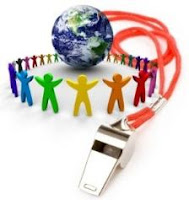The Parable of the Sadhu has been a required case study in ethics for many b-school students. I had to study ethics at some point in my educational background and was introduced to the story.
The case goes something like this: A Wall Street money dude goes to Himalayas to climb his mountain and runs into an old "Sadhu" on the ice pack in near death condition. A Sadhu is a spiritual person who shuns clothing and complicated ways and practices meditation and yoga. So the climbing party puts some clothing on the Sadhu and passes him off to the Japanese climbers, who then pass him off again after giving him some tea. Eventually the Wall Street dude's buddy takes the Sadhu down to a better elevation and points him in the direction of safety. No one wanted to stop and help because they were on their own difficult journey. Wall Street guy gets haunted later when back in New York about his greedy selfish actions.
I think the actual case is now owned by Harvard Business Review and so if you want real knowledge of
The Parable of the Sadhu, you have to pay them for it.
Thinking -we can still do for free.
Of course there is a method to my madness, I have a Sadhu right now I am tripping over. Someone in my summer exercise class is getting increasingly forgetful. No, not like losing the keys, or forgetting where you left your glasses, this is real forgetfulness. You see the rest of my community of friends take the class all year round, and I take during the summer only. So I can see the decline from year to year where my friends cannot.
What do I do? Does she have family? I met her mom at exercise class last Christmas, so she must have family. What if I intervene and upset her natural routine of getting on the community bus and spending the day exercising? What if she wanders away from the facility when it is dangerously hot or freezing? Lately she can loose her way back to her exercise chair spot. It's a real possibility.
This Sadhu of mine is haunting me. Ethical decisions are difficult to make. So many would say it's not your business, stay out. Or that's HIPPA privacy territory, you cannot discuss medical conditions of people. And the most frequent of them all----it's not your responsibility.
Who are we accountable to if not to our fellow human beings? Since when do we need to be assigned responsibility? I thought that was a birth right. You take care of those in need. Don't you?
Do you see the person holding the cup out or do you blindly look past the ruffled disheveled person asking for help? Do you rationalize that they must have tons of disability income or social security? Do you reason that you paid your social security taxes and that took care of your responsibility? Can you actually look into the eyes of the beggar?
I am beginning to think we all have a Sadhu somewhere in our lives, but we are so keen on getting to where we are going that we don't see the Sadhu. Where is this temporary trip on earth taking you?






